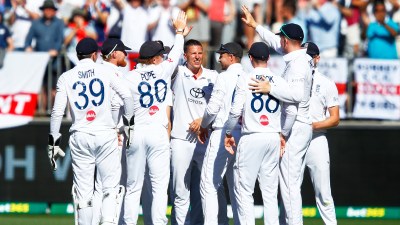Click here to follow Screen Digital on YouTube and stay updated with the latest from the world of cinema.
Kaathal as a ‘problem movie’: Jeo Baby and the Ibsenesque turn in Malayalam cinema
Kaathal is about the crisis, both private and public, that follows Omana’s filing for divorce from her husband Mathew Devassy, after 20 years of marriage, alleging her husband being a closet homosexual in relationship with another man and pointing out the denial of her sexual rights and cruel deprivation of her body.
 Jeo Baby's Kaathal – The Core, starring Mammootty and Jyotika in the lead roles, is now running in theatres. (Image: Kaathal - The Core/X)
Jeo Baby's Kaathal – The Core, starring Mammootty and Jyotika in the lead roles, is now running in theatres. (Image: Kaathal - The Core/X)In 1879, Henrik Ibsen’s hugely controversial and paradigm-shifting A Doll’s House showed a woman, Nora walking out on her husband leaving her home, giving a shocking twist to clichéd well-made melodramas, shot in middle-class drawing rooms, in which characters laughed, cried and waited but everything got resolved finally. When the nameless wife, the female protagonist of director Jeo Baby’s 2021 movie The Great Indian Kitchen, ran out of the typical, terrible kitchen, it looked like an Ibsenesque moment in Malayalam. With the newly released Kaathal, Jeo Baby seems to further the parallel.
In response to the hate and attack Ibsen received, he came up with another play in 1881: The Ghosts. The heroine of this play, Mrs. Alving, was the Nora who never left home. Haunted by the lies and pretensions The Ghosts’ protagonist had to create to serve in her socially assigned role, she witnesses the whimpering end of everything. Kaathal, a movie about people who are trapped, made to feel helpless and suffer in silence, could be seen as a sequel of the Ibsenian kind, not in the narrative or the characters, but in the shared spaces and their approach to social issues.
“Problem Plays” is the generic term used for playwrights, starting with Ibsen, who used theatre to present social issues, exploring not what characters do or not do, but why they cannot do anything else in their givens, providing insights into the social order. Both The Great Indian Kitchen and Kaathal could then be called “problem movies” in that they present a social problem — one that most know and live with but refuse to notice or engage with.
In The Great Indian Kitchen, the camera repeatedly shows the kitchen from the angle of the one who has to work there, foregrounding labour- the repetition in it and the inescapability of it. Kaathal is about the crisis, both private and public, that follows Omana’s (Jyothika) filing for divorce from her husband Mathew Devassy (Mammootty), a retired bank employee and a candidate in the Panchayat ward by-election in a village in Kerala, after twenty years of marriage, alleging her husband is a closet homosexual who is in relationship with another man and pointing out the denial of her sexual rights and cruel deprivation of her body. The movie is built around the norms that people are supposed to play up in conjugal relationships and the union of silences, evasions and suffocations necessitated by this norm using the genre of melodrama with a new social content.
Watch Kaathal – The Core trailer here:
Kaathal doesn’t want one of the most effective aspects of melodrama to be lost: the possibility of identification with the character and the ability to empathise. Often this characteristic is misused, as in theme-centred movies in an attempt to continue to impose the existing system or abandoned, as in composition-centred, art movies.
This slow-growing, softly-presented and neatly-built up movie wants the spectators to identify and empathise: through this approach, it wants to point to the vacancy hetero-normativity has created in the mind of the society. Even the candles seem to act — the sadness of candles and the fact that they are blighted themselves — a quintessentially Christian image of losing onself for others — is a poignant tale with the camera on how people are always already victims and instruments at the same time.
The problem and the ramifications of it are constituted through muted, high quality melodrama and evocation of feelings and situation through visual, auditory and expressive moments and deft use of technical possibilities of the medium. If The Great Indian Kitchen showed how insufferable the male entitlement becomes through its everyday, Kaathal begins after two decades of silent suffering and in that sense it starts at the end, a beginning of sorts. Both the movies remind us of Ibsen in exploring the problem.
Though there have been other movies that deal with lesbian [Randu Penkuttikal (1978), Desadanakkili Karayaarilla (1986), Sancharam (2004)] and gay [Papilio Budha (2013), Mumbai Police (2013) and Moothon (2019)] themes in Malayalam, Mammootty’s presence makes a lot of difference in this movie. This is not just because of his four-decade long superstardom or his most definining image of Malayali masculinity with his fair, moustache-ed, sharp and masculine features- the model body, the maryada-purushotham family-man screen-personae and public self alone but his pivotal role in the Malayalam melodrama. “When Mammootty cries Malayalis cry with him”, runs a reel-lore common sense. Kaathal very intelligently uses that image in building suspense brick by brick, humanizes the story with his embodiment and pushes the problem to the point that it is a crisis the spectators have to live through and not abandon.
The theatre review from people of all age groups, genders and class groups suggest how effective this has been, as the movie is more about the silences and absences around which the traditional family is built. The sadness is so prevalent and undeniable that it would look awfully callous and cruel to dismiss it even for those who might oppose homosexuality.
The movie, nevertheless, recognizes that social positions matter and consequences differ: Mathew has his candidature and public spaces, driver Thankan (Sudhi Kozhikode) has no listener, no access to speech. While the middle-class Omana and Mathew’s daughter Femi (Anagha Maya Ravi) seems to face no issue in her seemingly urban, middle-class college due to the issues surrounding the divorce petition; Kuttayi, Thankan’s nephew (Alex Alister), in the rural, lower-class junior college space has to get into constant fights after the petition surfaces. Thus the movie also serves as a register of how class operates in debates around sexuality.
It is important to account for three kinds of social forces that enable Kaathal.
First, the women’s movement in Kerala that has made itself visible: the movement of sales women for washrooms at workplace and the permission to sit, the formation of Women in Cinema Collective, the historic movement of Catholic nuns and the rebellious women in Haritha- the Muslim League women’s group, and so on, have made it abundantly clear that they are the conscience keepers of the state. Omana, in her powerful, confident and deeply ethical assertion, through her truth, is seeking to set everyone free.
Secondly, the youngsters for whom multiple sexualities and fluidity of body is a given and not a point to laboriously arrive at, thanks to their global exposure and the discourses around. In addition to this, the legal scene after the 2018 Supreme Court verdict decriminalizing homosexuality, as is explicated in the court scene between Adv. Sameera (Muthumani) and Adv. Sajitha (Chinnu Chandni), is also a partner in the making of this.
A merger of women and youngsters and an enabling legal paradigm, as a republic’s law ought to, makes such a movie possible and the movie does hold it in the fold.
Ibsen either writes tragedies or they leave us with a completely non-existent social paradigm. In the late nineteenth century, women had no option between homes and brothels, between being a home-maker or a street walker and this constitutes the social emptiness of his dramaturgy. But Jeo Baby works with a society where women can go and they do go; the only difference is that Malayalam middle-class melodrama has only been, through its emotional athyachar, making them stay put. His task is to change the cinema and make it honest about the social norms.
Once the problem is elaborated on and established effectively, he does move to solutions that might look smooth closures, making much of the last five minutes mere addendums. This aesthetic choice is much unlike Ibsen whose was intellectually pessimistic about the society’s chances once honesty dawns on them as inevitable. The Left progressive politics the movie depicts is more on what left should grow to become more just and more egalitarian- engage with power in private spaces, everyday modules and inscribed bodies, rather than what it now is: Kaathal sets a destination for social justice politics.
At a time, when a people feel they are drifting further apart, when disestablishmentarianism is championed by people in power, when individuals are suffering from a collective fatigue looking around, art, Jeo baby might have us believe, should equip people collectively to look both ahead and inward, rather than challenging them. Through his choice of shots and dialogues, he makes it impossible to be moralistically outraged and hurt but inevitable to be aware of the deep pain social customs can inflict. He is neither a superfluous propagandist nor an indulgent aestheticist. Beyond schematic optimism and cynical pessimism, there is a new route and it is an aesthetic and ethical possibility, the film’s narrative and making seem to substantiate.
Just like Omana, Jeo Baby drives the problem home. Irrevocably. And manages to evolve collective possibilities for the people!
(N P Ashley teaches English at St. Stephen’s College, Delhi)
- 01
- 02
- 03
- 04
- 05


































